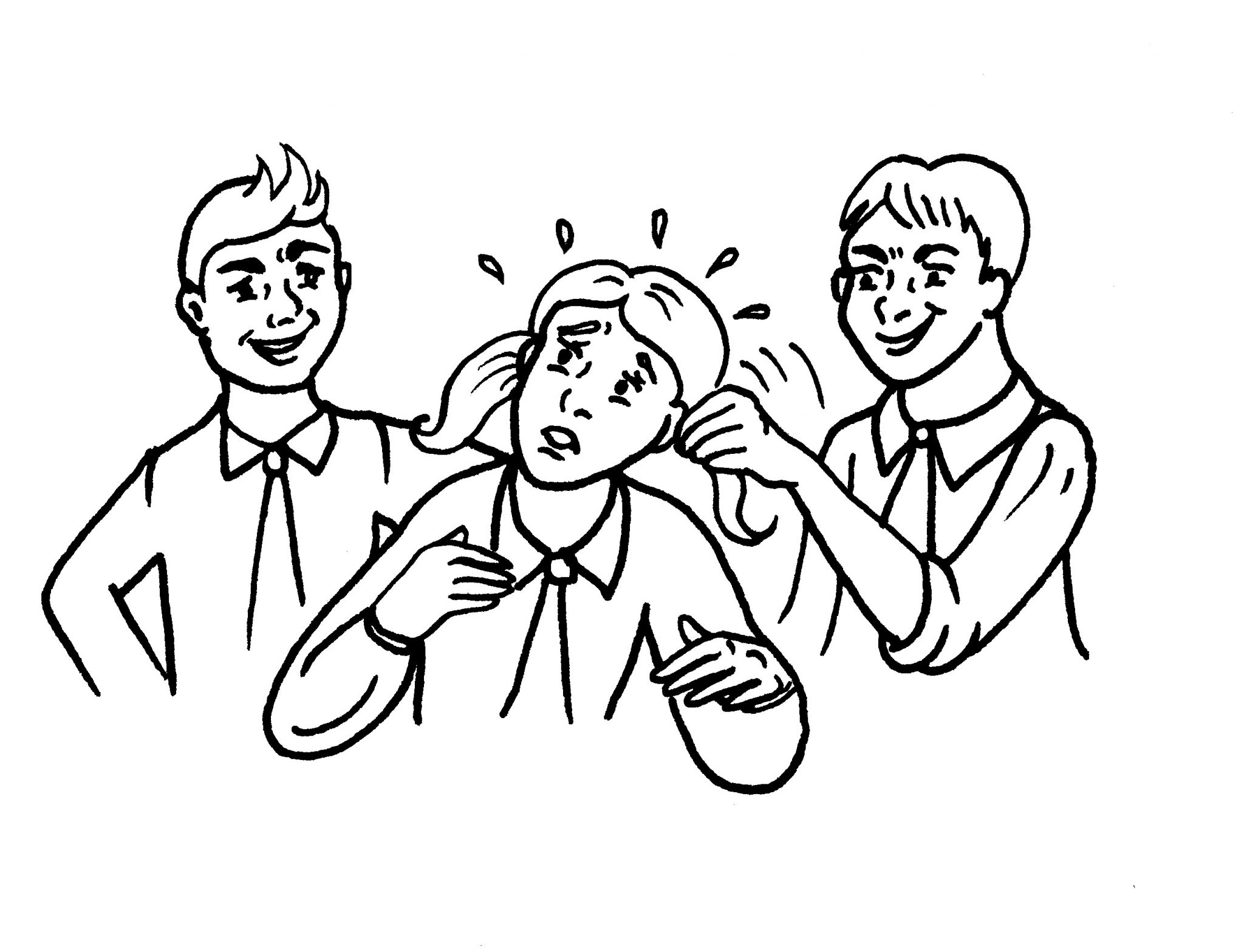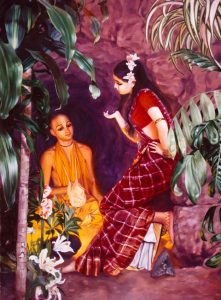 Aniruddha dāsa: While you were giving class yesterday, my godbrother Harer-nāmānanda prabhu (Spanish) prayed to Śrī Kṛṣṇa, “I want to have a close relationship with Śrīla Bhaktivedānta Nārāyaṇa Mahārāja.” Then, when you were leaving the temple, you approached him and asked, “Who are you?”
Aniruddha dāsa: While you were giving class yesterday, my godbrother Harer-nāmānanda prabhu (Spanish) prayed to Śrī Kṛṣṇa, “I want to have a close relationship with Śrīla Bhaktivedānta Nārāyaṇa Mahārāja.” Then, when you were leaving the temple, you approached him and asked, “Who are you?”
He was amazed and startled, thinking, “How did he know?” He is taking that as a sign of the beginning of his establishing a closer relationship with you. He is a very serious disciple of Prabhupāda. He wants to have a closer relationship and serve you, but he wants to know how.
Śrīla Bhaktivedānta Nārāyaṇa Mahārāja: [To Harer-nāmānanda dāsa] Hear from me for four more days, and our relation will strengthen automatically.
Śrīpāda Mādhava Mahārāja: He wants to know how he can serve you more.
Śrīla Bhaktivedānta Nārāyaṇa Mahārāja: He can serve in any way he thinks best.
Śivānanda dāsa: One or two years ago, in Venice, I was on a morning walk with Śrīla Gurudeva, Vrajanātha prabhu, and Śrīpāda Mādhava Mahārāja. I was a little bit upset with some of the activities of ISKCON, and I asked Śrīla Gurudeva, “Are these people offenders or asuras (demons)?” Śrīla Gurudeva said, “They are my children.”
Śrīla Bhaktivedānta Nārāyaṇa Mahārāja: [To Śrīpāda Sajjana Mahārāja] Can you explain the meaning of māyā as I described in my class yesterday? What is māyā?
Śrīpāda Sajjana Mahārāja: It is hard for me to speak without prior preparation.
Devotee: Māyā is the desire to be a second Kṛṣṇa, and that misunderstanding creates all the problems of this world.
Śrīla Bhaktivedānta Nārāyaṇa Mahārāja: You should know that there are two kinds of māyā. Ultimately, māyā is yogamāyā, Śrī Kṛṣṇa’s internal desire-potency, whose function is in Goloka Vṛndāvana and in Kṛṣṇa’s prakaṭa-līlā, His pastimes as manifest in this material world. Yogamāyām upāśritaḥ. In His rāsa-līlā Kṛṣṇa employed His yogamāyā, His potency that makes the impossible possible, and that yogamāyā potency made all arrangements for Him and the gopīs. Without yogamāyā, rāsa-līlā would not have been able to take place.
There is no function of yogamāyā in this world. Here in this world, māyā refers only to worldly māyā, by which creation, sustenance, and destruction of the cosmos take place. This māyā is a shadow of the real māyā, or yogamāyā.
Māyā is also the thinking that, “I am this body, these relatives are mine, this wealth is mine, this land is mine, and all my possessions are mine.” We think, “Oh, wealth will save me; my relatives will help me.” This conception is māyā.
Māyā is able to defeat everyone in this world. In Kali-yuga, this present age of quarrel and hypocrisy, she especially attacks sannyāsīs; so be very careful.
Śrīpāda Nemi Mahārāja: How does māyā attack the sannyāsīs, Śrīla Gurudeva, and how can we be safe?
Śrīla Bhaktivedānta Nārāyaṇa Mahārāja: She sees that the sannyāsī is the best person to be attacked.
Śrīpāda Nemi Mahārāja: So how can they be saved?
Śrīla Bhaktivedānta Nārāyaṇa Mahārāja: They can be saved only by surrender to Śrī  Kṛṣṇa, Guru, and Vaiṣṇavas. If sannyāsīs think, “There is no one to control me,” they will surely land in the lap of māyā. Those sannyāsīs who always remember Kṛṣṇa, Guru, and Vaiṣṇavas will be protected.
Kṛṣṇa, Guru, and Vaiṣṇavas. If sannyāsīs think, “There is no one to control me,” they will surely land in the lap of māyā. Those sannyāsīs who always remember Kṛṣṇa, Guru, and Vaiṣṇavas will be protected.
Viśvambhara dāsa: Śrīla Gurudeva, for so long you have been asking me which devotees are the top book distributors. Now we have determined the top three book distributors by how many books they have distributed, but we are wondering if that is actually the best way to measure. Is there a way to measure by quality?
The only way to practically measure right now is through quantity. But there is some doubt in several devotees’ minds in this regard; they have expressed some dissatisfaction with this method. So, we are wondering if there is another way to measure for next year.
Vrajanātha dāsa: Some devotees are saying that ISKCON leaders used to encourage the number one, two, and three distributors, who, by so many tricks, ‘by hook or by crook’ distributed books and then left devotional service. Many of the topmost distributors left Kṛṣṇa consciousness and are now completely in māyā.
Śrīla Bhaktivedānta Nārāyaṇa Mahārāja: So, be careful.
Still, we should give some reward to the best distributors.
Śrīpāda Mādhava Mahārāja: How can they judge who is the top?
Śrīla Bhaktivedānta Nārāyaṇa Mahārāja: By how many books they are distributing; only by this way.
Viśvambhara dāsa: Another question is this: We are inspired to give the top distributor a big recognition – a ticket to Kārtika – but some devotees think that that is too much.
Śrīla Bhaktivedānta Nārāyaṇa Mahārāja: They should decide. A committee will decide.
Śrīpāda Padmanābha Mahārāja: Śrīla Gurudeva, yesterday you mentioned that the difference between your brahmacārīs and sannyāsīs and those of our Śrīla Prabhupāda is that you are training your brahmacārīs and sannyāsīs in such a way that they will not fall down in the future. You have trained all the brahmacārīs who have been with you for many years, telling them very strictly that they must never give up their brahmacarya, their saffron cloth.
One thing to note is that during the time of our Prabhupāda, he encouraged brahmacarya, but he did not enforce it.
Śrīla Bhaktivedānta Nārāyaṇa Mahārāja: Yes, he did not enforce brahmacarya, because it was the beginning of the Kṛṣṇa consciousness mission in the West.*
Śrīpāda Padmanābha Mahārāja: Yes. He did not enforce it. If they wanted to marry, there was no problem.
Śrīpāda Bhāgavata Mahārāja: In fact, in the beginning he personally arranged the marriages, because he saw that they were not capable of remaining brahmacārīs.
Śrīla Bhaktivedānta Nārāyaṇa Mahārāja: He was very, very intelligent. Somehow he arrested them all. He trained them to make money also. In this way, even if they would give up life in the maṭha (temple), they would be able to easily maintain their lives.
Gokula dāsa (from Australia): Śrīla Gurudeva, I have a question. Since the beginning you have encouraged us to form a society in this saṅga, and now the leaders are doing this. Yesterday there was a big meeting.
But some devotees have a doubt regarding the establishment of a society, and I also have a doubt. Those who assume management positions tend to be very strong, pushy, and forceful, especially in Western societies. How can we best avoid a body of controlling leaders? Many are asking this question.
Śrīla Bhaktivedānta Nārāyaṇa Mahārāja: We do not control here. I do not want to control anyone by force. I have love and affection for everyone, and I control everyone by that love and affection.
Śrīpāda Mādhava Mahārāja: Gokula is saying that if there are managers in the society, then by their natures they will want to control everyone.
Śrīla Bhaktivedānta Nārāyaṇa Mahārāja: No, no. Why would that happen? I always remind the leaders to think that they are servants of the maṭha. I make them maṭha commanders to serve all. I tell them not to think, “I am the controller; I am the head.” I tell them, “Don’t think, ‘I am the monarch.’ ” They should consult with all others before doing anything.
Gokula dāsa: I see that several institutions, like ISKCON and even Śrīla Gaura Govinda Mahārāja’s institution in Bhubanesvara, are being managed with a mentality of control. Only one institution was not like that, and that was the Gauḍīya Vedanta Samiti lead by you and Śrīla Trivikrama Mahārāja and Śrīla Vāmana Mahārāja.
Vrajanātha dāsa: Gurudeva, when we first came to Kārtika, we saw how everything was managed by you. We saw how there were no management meetings; nothing of the sort.
Śrīla Bhaktivedānta Nārāyaṇa Mahārāja: There was no meeting at all at that time, and still there is no meeting. Everything transpires as if automatically.
Vrajanātha dāsa: On the contrary, we (Western devotees) have to sit down from time to time and have meetings. We have to say to everyone at the meeting, “You have this job and you have that job, and if you don’t do your job, then everything will fail.” But there are no meetings in your saṅga. Everything happens automatically.
Śrīla Bhaktivedānta Nārāyaṇa Mahārāja: No meetings at all.
Devotee: Śrīla Gurudeva, when there are properties and money involved, there is always greed. How can we avoid that, and how can we avoid the way we suffered in ISKCON? When Śrīla Prabhupāda was here, nothing like this happened; but after his departure so many leaders began fighting over properties and temples, and kicking out devotees. Ambition and greed tend to come to societies, desiring to destroy them. How can we avoid this?
Śrīla Bhaktivedānta Nārāyaṇa Mahārāja: The members of the ‘controlling committee’ must be very selfless, surrendered to Guru, Vaiṣṇavas, and Kṛṣṇa, and also detached from worldly wealth and desires. I want to make members like this. Māyā may come, but we are trying by this method.
Purandara dāsa: In the absence of good association, leaders may adopt their old bad habits of trying to be controllers. How can that be avoided?
Śrīla Bhaktivedānta Nārāyaṇa Mahārāja: Some corruption dwelled in Satya-yuga, more so in Dvāpara, more in Tretā, and still more so in Kali-yuga. We are trying, but still it may come, and therefore it is essential that we are careful in that regard. We find that sometimes, if a  father has two sons, the sons quarrel and one shoots the other instead of loving him. This is the world; this is why we should chant and remember Kṛṣṇa, and be surrendered to Kṛṣṇa and guru. This is why. Without this, any scheme will fail.
father has two sons, the sons quarrel and one shoots the other instead of loving him. This is the world; this is why we should chant and remember Kṛṣṇa, and be surrendered to Kṛṣṇa and guru. This is why. Without this, any scheme will fail.
Gokula dāsa: It always seems that some persons are there to persecute others, and sometimes I’m thinking that this is Kṛṣṇa’s arrangement to teach us to be more tolerant.
Śrīla Bhaktivedānta Nārāyaṇa Mahārāja: No, this is not Kṛṣṇa’s arrangement. He never likes things like this. He is very merciful and kind.
Śrīpāda Mādhava Mahārāja: This is the arrangement of Kali (the personification of this age of quarrel and hypocrisy).
Śrīla Bhaktivedānta Nārāyaṇa Mahārāja: Those who are selfish are simply cheaters.
[To Aniruddha dāsa] Don’t criticize ISKCON, as you have done. The ISKCON devotees are also my children. Don’t speak about them with such anger. Be calm and quiet, and perform bhajana. Don’t see anyone’s faults. See your own faults. Do you understand?
Aniruddha dāsa: But if we keep a humble attitude…
Śrīla Bhaktivedānta Nārāyaṇa Mahārāja: Try to follow these principles of humility and respect for all. These are not my words. Rather, śāstra is telling this and Kṛṣṇa is telling this. Whoever criticizes others will see that he has absorbed all the bad qualities he is criticizing. He will see that those bad qualities have entered his own being.
*For preaching we give young boys sannyāsa, but actually it is being experienced that they are not fit for sannyāsa. There is no harm, however, if one thinks that he is unfit for sannyāsa; if he is very much agitated sexually, he should go to the āśrama where sex is allowed, namely the gṛhastha-āśrama (Śrīmad-Bhāgavatam 8.2.30, Purport by Śrīla Bhaktivedānta Svāmī Mahārāja).
Image/Art made possible by Pixabay.com








